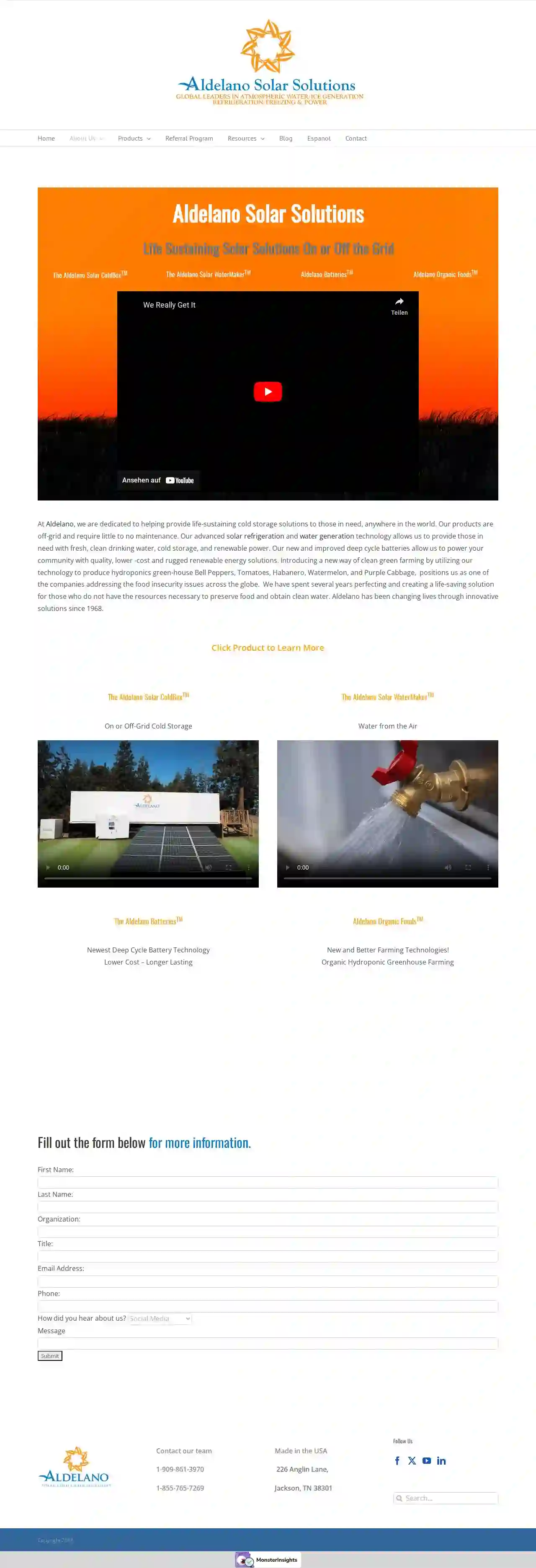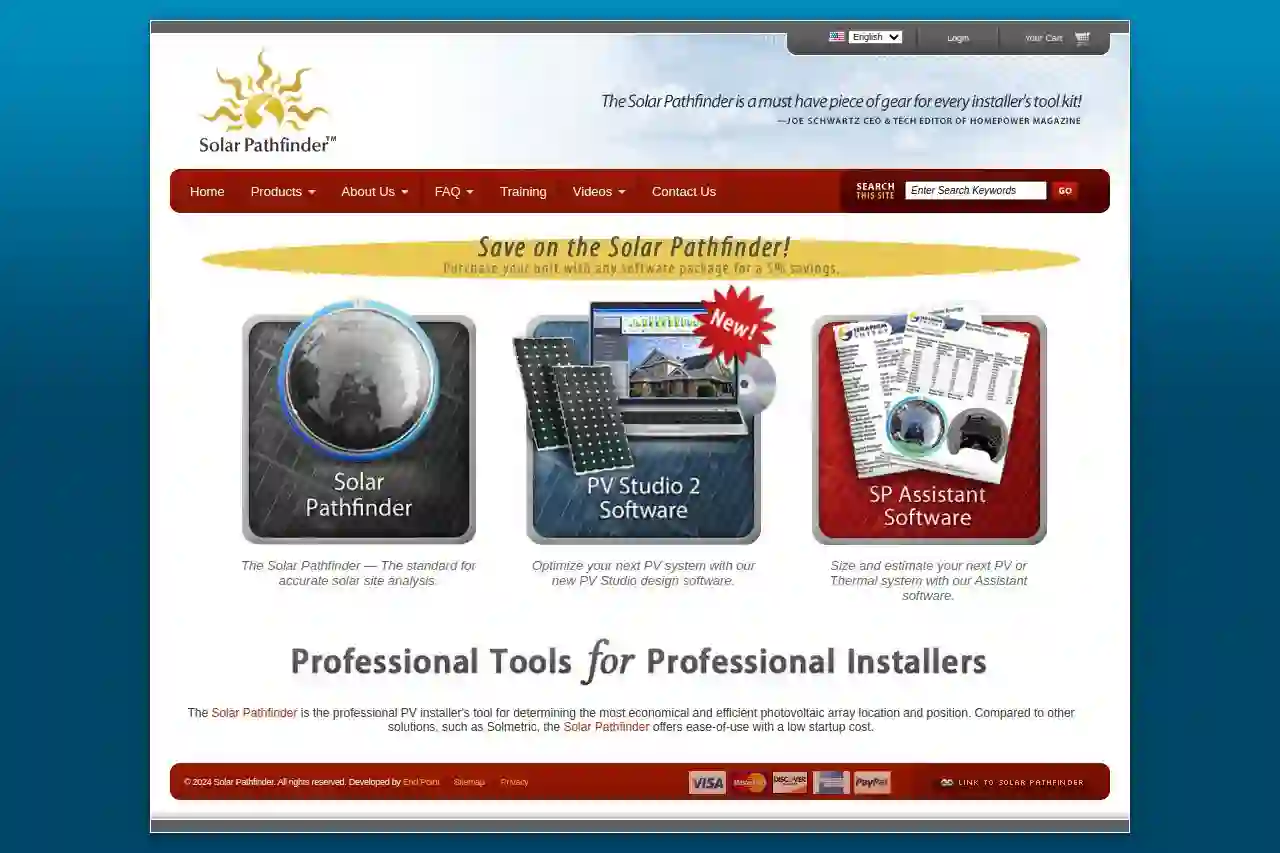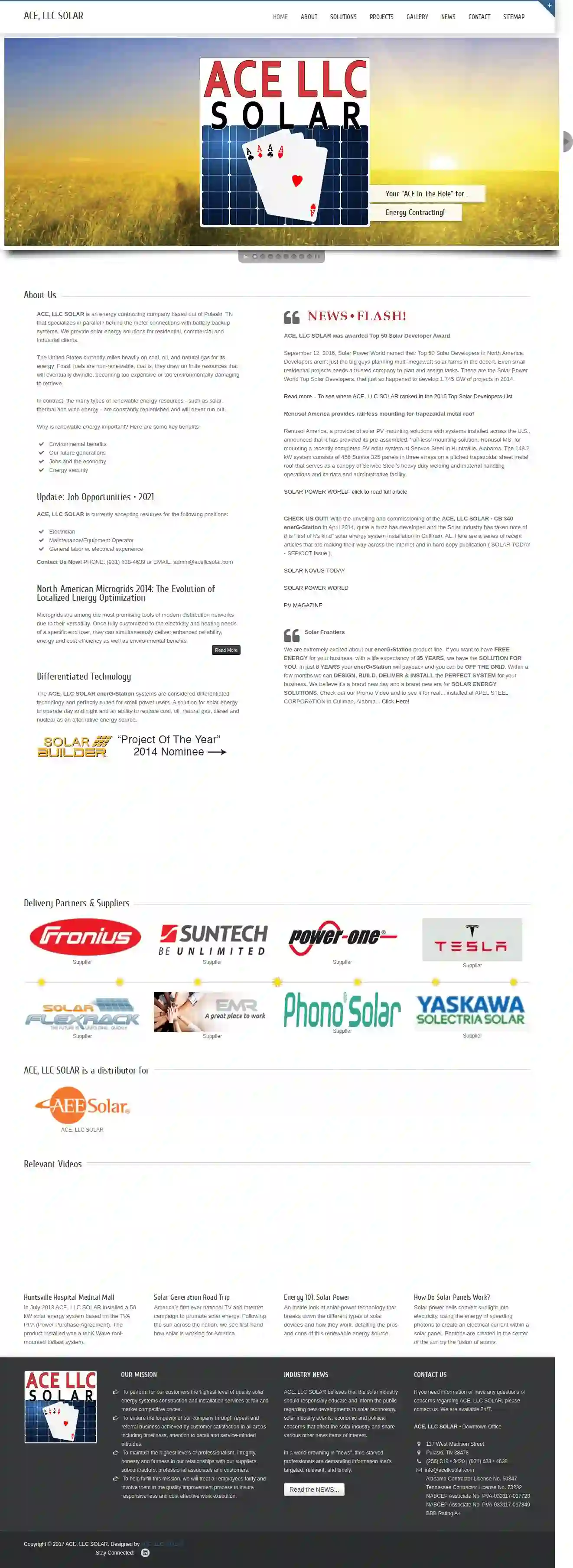Commercial Solar Installers Knoxville
Find Commercial Solar Panel Installation in Knoxville
Receive up to 3 Business Solar Installers quotes for your project today! Compare profiles, reviews, accreditations, portfolio, etc... and choose the best deal.

Solar Alliance, LLC
4.118 reviews123 Solar Way, Suite 100, Knoxville, 37830, USSolar Alliance is your engineering, procurement and construction source for solar projects on every scale – from large commercial installations to solar for small businesses. The Solar Alliance team is committed to helping you meet corporate mandates, evaluate and conserve current energy usage, then save money with solar. Solar Alliance is your source for solar power design in the Southeast and beyond. With years of experience and professionals certified by the North American Board of Energy Practitioners (NABCEP), we have the ability to provide solutions.
- Services
- Why Us?
- Accreditations
- Our Team
- Testimonials
- Gallery
Get Quote
JTE Solar Inc
55 reviews220 Great Circle Suite 140, Nashville, TN 37228, 37228, USJTE Solar Inc. is a Middle Tennessee company with a fully in-house team. We offer the best value available with no predatory loan agreements and the highest quality installation possible. Our team of experts will work with you to create a custom design that includes strategically placed solar panels and backup batteries to ensure your home is always powered, even during power outages.
- Services
- Why Us?
- Accreditations
- Our Team
- Testimonials
- Gallery
Get Quote
Aldelano Solar Solutions
51 reviews226 Anglin Lane, Jackson, TN, 38301, USAldelano Solar Solutions is dedicated to providing life-sustaining cold storage solutions to those in need, anywhere in the world. Our products are off-grid and require little to no maintenance. Our advanced solar refrigeration and water generation technology allows us to provide those in need with fresh, clean drinking water, cold storage, and renewable power. We have spent several years perfecting and creating a life-saving solution for those who do not have the resources necessary to preserve food and obtain clean water. Aldelano has been changing lives through innovative solutions since 1968.
- Services
- Why Us?
- Accreditations
- Our Team
- Testimonials
- Gallery
Get Quote
Midsouth Solar Pros
513 reviewsMemphis, TN, USA, 123 Solar Street, 38104, USMidsouth Solar Pros is a leading provider of solar solutions for residential and commercial properties in Tennessee, Mississippi, and Arkansas. They offer affordable solar panels that can save homeowners over $25,000 in electricity costs over 25 years and boost the value of their homes by up to 4.1%. Their team of experts focuses on making homes more energy-efficient and can install rooftop panels on various types of roofs. They also provide maintenance services for solar panels, including warranty repairs, inspections, and troubleshooting.
- Services
- Why Us?
- Accreditations
- Our Team
- Testimonials
- Gallery
Get Quote
Solar Pathfinder - Solar Site Analysis
58 reviews123 Solar Way, Beverly Hills, CA, 90210, USThe Solar Pathfinder is a must-have piece of gear for every installer's tool kit! It is the professional PV installer's tool for determining the most economical and efficient photovoltaic array location and position. Compared to other solutions, such as Solmetric, the Solar Pathfinder offers ease-of-use with a low startup cost.
- Services
- Why Us?
- Accreditations
- Our Team
- Testimonials
- Gallery
Get Quote
LightWave Solar, LLC
4.761 reviewsSuite 104, Nashville, TN, 3026 Owen Drive, 37013, USThe Trusted Source For Turnkey Solar Solutions Since 2006. Experience. Quality. Passion. For 17 years LightWave Solar has been helping people meet their energy goals. Discover custom solar installations that have the power to strengthen your home, business, organization, and community.
- Services
- Why Us?
- Accreditations
- Our Team
- Testimonials
- Gallery
Get Quote
ACE, LLC SOLAR
55 reviews117 West Madison Street, Pulaski, 38478, USACE, LLC SOLAR is an energy contracting company based out of Pulaski, Tennessee. We specialize in grid-tied solar systems and energy efficiency projects. Our energy solutions provide benefits for residential, commercial and industrial clients.
- Services
- Why Us?
- Accreditations
- Our Team
- Gallery
Get Quote
Nashville Solar Works
531 reviews123 Solar Lane, Nashville, 37203, USNashville Solar Works is a boutique energy solutions company in Nashville providing PV system installation to homeowners and businesses across Tennessee. They offer a complimentary Energy Audit to help you maximize your solar installation in Tennessee.
- Services
- Why Us?
- Accreditations
- Our Team
- Testimonials
- Gallery
Get Quote
Tennessee Solar Energy Industries Association
123 Solar Street, Suite 100, Nashville, 37201, USThe Tennessee Solar Energy Industries Association (TenneSEIA) is a non-profit organization that promotes the development of solar energy and complementary technologies in the Tennessee Valley. Their mission is to position the region's residents and businesses as leaders in clean energy deployment and economic development. TenneSEIA provides resources, events, and educational initiatives to support the growth of the solar industry in Tennessee.
- Services
- Why Us?
- Accreditations
- Our Team
- Testimonials
- Gallery
Get Quote
Scenic City Solar
4.815 reviews951 S. Watkins St., Chattanooga, 37404, USScenic City Solar is a leading provider of turnkey solar solutions in the Southeastern United States. With a commitment to affordability and sustainability, they offer a range of services including commercial, residential, and agricultural solar installations. Their team of professionals is dedicated to helping clients achieve energy independence through solar power.
- Services
- Why Us?
- Accreditations
- Our Team
- Testimonials
- Gallery
Get Quote
Over 4,210+ Solar Companies in our network
Our solar companies operate in Knoxville & surrounding areas!
SolarCompaniesHub has curated and vetted the Best Solar Installers in Knoxville. Find a top & trustworthy contractor today.
Frequently Asked Questions About Commercial Solar Installations
- Panel Cleaning: Periodic cleaning of the panels removes dirt, debris, and bird droppings that can reduce energy production.
- Visual Inspections: Regularly inspect the system for signs of damage, loose wiring, or other issues.
- Inverter Monitoring: Monitor the inverter's performance and address any error codes or performance issues promptly.
- Vegetation Management: Trim trees and vegetation around the solar array to prevent shading, which can significantly reduce energy output.
- Professional Maintenance: It's recommended to have a professional solar installer or maintenance provider conduct a more thorough inspection and maintenance check every few years to identify potential problems and ensure optimal system performance.
- System Size: Larger systems take longer to install.
- Roof or Ground Mount: Ground-mounted systems often involve more site preparation and civil work.
- Permitting and Inspections: The time required to obtain permits and schedule inspections can vary by location.
- Weather Conditions: Inclement weather can delay installation.
- Installer's Schedule: The installer's availability and workload will also affect the timeline.
- System Cost: The total upfront cost of the system, including panels, inverters, installation, permitting, and other expenses.
- Energy Savings: The estimated annual savings on your electricity bill based on the projected energy production of the system.
- Incentives and Rebates: Include any applicable tax credits, rebates, or other financial incentives that reduce the net cost of the system.
- Depreciation: Factor in the depreciation value of the system over time, which can reduce your tax liability.
- Maintenance Costs: Estimate the annual maintenance costs for your solar system.
- Electricity Rate Inflation: Consider the potential increase in electricity rates over time, which will amplify your energy savings from solar.
- Investment Tax Credit (ITC): A federal tax credit that allows you to deduct a percentage of the cost of your solar system from your federal taxes.
- Accelerated Depreciation: A tax benefit that allows you to depreciate the value of your solar system over a shorter period, reducing your tax liability.
- State and Local Rebates: Some states and municipalities offer cash rebates or other financial incentives for commercial solar installations.
- Performance-Based Incentives (PBIs): Some programs provide payments based on the amount of solar energy your system generates.
- Renewable Energy Credits (RECs): You can earn and sell RECs, which represent the environmental attributes of your solar energy production.
What is involved in the maintenance of a commercial solar system?
How long does it take to install a commercial solar system?
How do I calculate the ROI of my commercial solar investment?
What are the available government incentives for commercial solar in USA?
What is involved in the maintenance of a commercial solar system?
- Panel Cleaning: Periodic cleaning of the panels removes dirt, debris, and bird droppings that can reduce energy production.
- Visual Inspections: Regularly inspect the system for signs of damage, loose wiring, or other issues.
- Inverter Monitoring: Monitor the inverter's performance and address any error codes or performance issues promptly.
- Vegetation Management: Trim trees and vegetation around the solar array to prevent shading, which can significantly reduce energy output.
- Professional Maintenance: It's recommended to have a professional solar installer or maintenance provider conduct a more thorough inspection and maintenance check every few years to identify potential problems and ensure optimal system performance.
How long does it take to install a commercial solar system?
- System Size: Larger systems take longer to install.
- Roof or Ground Mount: Ground-mounted systems often involve more site preparation and civil work.
- Permitting and Inspections: The time required to obtain permits and schedule inspections can vary by location.
- Weather Conditions: Inclement weather can delay installation.
- Installer's Schedule: The installer's availability and workload will also affect the timeline.
How do I calculate the ROI of my commercial solar investment?
- System Cost: The total upfront cost of the system, including panels, inverters, installation, permitting, and other expenses.
- Energy Savings: The estimated annual savings on your electricity bill based on the projected energy production of the system.
- Incentives and Rebates: Include any applicable tax credits, rebates, or other financial incentives that reduce the net cost of the system.
- Depreciation: Factor in the depreciation value of the system over time, which can reduce your tax liability.
- Maintenance Costs: Estimate the annual maintenance costs for your solar system.
- Electricity Rate Inflation: Consider the potential increase in electricity rates over time, which will amplify your energy savings from solar.
What are the available government incentives for commercial solar in USA?
- Investment Tax Credit (ITC): A federal tax credit that allows you to deduct a percentage of the cost of your solar system from your federal taxes.
- Accelerated Depreciation: A tax benefit that allows you to depreciate the value of your solar system over a shorter period, reducing your tax liability.
- State and Local Rebates: Some states and municipalities offer cash rebates or other financial incentives for commercial solar installations.
- Performance-Based Incentives (PBIs): Some programs provide payments based on the amount of solar energy your system generates.
- Renewable Energy Credits (RECs): You can earn and sell RECs, which represent the environmental attributes of your solar energy production.